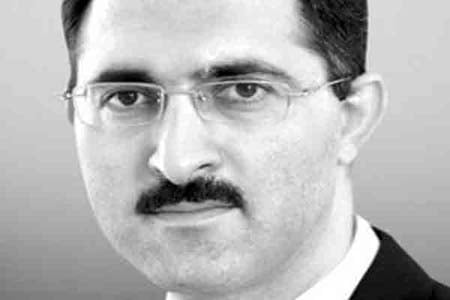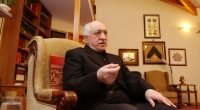Arbitrary rule in Turkey

Date posted: December 2, 2013
ABDULLAH BOZKURT
On Nov. 18, in a Cabinet meeting that lasted more than seven hours, Prime Minister Recep Tayyip Erdoğan discussed the ban on private prep schools with his ministers for almost four hours.
The meeting came only four days after the draft bill on the ban was leaked to Turkey’s largest circulated paper Zaman. In what seemed to be a divided house in the Cabinet on the issue, Justice Minister Sadullah Ergin was one of those who voiced his opposition to the blanket ban, arguing that the legislative change to that effect is destined to fail a possible legal challenge in the Constitutional Court. Even if it passes the test in Turkey’s top court, Ergin said, the bill would in all likelihood not withstand a challenge in the Strasbourg-based European Court of Human Rights (ECtHR), a leading rights court in Europe whose decisions are binding on Turkey.
Not impressed by his justice minister’s reasonable concerns, Erdoğan brushed aside other opposing voices in Cabinet as well, vowing to go ahead with the ban despite legal challenges, economic ramifications and political consequences. An insider’s recollection of this Cabinet meeting tells the tale of the prep school ban in plain truth: It is a politically motivated move on the part of Erdoğan, who took it upon himself to stigmatize Turkey’s largest civic movement, Hizmet, which has differences with his own line of thinking on a number of issues. Hence, it was useless to discuss the ban on merit at all, be it in legal challenges, economic consequences or in basic rights and liberties. Erdoğan had no interest in hearing all these arguments that ran contrary to what he personally set out to accomplish. That is why the bill lacks a comprehensive impact analysis statement, legally required for draft bills so that the public, including members of Parliament, has an idea of the bill’s ramifications, economically and socially.
It is clear that Erdoğan does not trust Ergin and the Justice Ministry in formulating such laws that will have drastic implications in the justice system, let alone in other areas. The fact that some crucial legislative changes were drafted in the past by a small cadre of Erdoğan’s trusted men at the Prime Ministry, bypassing the Justice Ministry, which is the traditional venue for draft bills according to established practice, worries many in Turkey over the state of affairs in the Turkish government. The Justice Ministry had learned about some of the draft bills only after they were submitted to Parliament for debate. Erdoğan believes if he involves the Justice Ministry, the process will be stalled or at least slowed down and possibly amended to reflect better alignment with the existing laws and constitution.
If it was up to the justice minister, we would have seen the merging of both the third and fourth judicial reform packages into one when it was submitted to Parliament. Erdoğan even had the drafts that were prepared at the Justice Ministry watered down in his office. The same can also be said about Ergin’s relations with the Foreign Ministry. Ergin, who is well respected by his Western counterparts for his rights-based and reform-minded approach, has been thwarted by Foreign Minister Ahmet Davutoğlu and his diplomats on more than one occasion when he wanted to work on judicial cooperation with regional organizations like the Council of Europe and the European Union as well as with Turkey’s allies and friends. His personal appeals to Davutoğlu to cut the red tape at the Foreign Ministry to allow the Justice Ministry to better interact with interlocutors in Brussels and Strasbourg were left unaddressed most of the time. He had to appoint his own representatives to these two important cities to do business, bypassing Davutoğlu and the Turkish embassies.
Ergin, who deserves credit for successfully reducing the backlog of cases from Turkey with a series of agreements with the ECtHR including friendly settlements and compensation commissions, helped Turkey drop two notches down to fourth place in terms of the total number of cases pending against the country at the Strasbourg court. He is now worried that if Erdoğan gets his way, that success will become only a temporary blip on the radar. Although Erdoğan does not seem to care much about the legal consequences of ECtHR decisions and can order his government to overlook the court’s decision by not enforcing judgments, for the sake of legal entertainment, let’s look at how a class-action legal challenge from some 3,000 private prep school owners would fare at the Strasbourg human rights court.
First, based on case law at the ECtHR, one can predict fairly easily which way the court will lean on the prep school ban in Turkey. For one, the closure of perfectly legal and legitimate businesses amounts to an interference with the right to the peaceful enjoyment of possessions guaranteed by Article 1 of Protocol No. 1 of the European Convention on Human Rights (ECHR). The convention says that “every natural or legal person is entitled to the peaceful enjoyment of his possessions. No one shall be deprived of his possessions except in the public interest and subject to the conditions provided for by law and by the general principles of international law.”
Second, in the court’s assessment, any interference with the peaceful enjoyment of possessions should be lawful. Simply legislating the ban by Parliament does not meet the criteria of lawfulness for the interference. Since the prep schools’ owners will be deprived of their businesses and properties, I do not think that claiming the existence of the law will satisfy the court. ECtHR precedents state that the legal basis must have a certain quality, namely it must be compatible with the rule of law and must provide guarantees against arbitrariness. Closing down perfectly legitimate businesses and halting their operations abruptly qualifies as an arbitrary step by the Turkish government. Case law also underlines that the legal norms used by government should be sufficiently “accessible, precise and foreseeable” in their application. In the prep school controversy, there was no predictability for owners who would have not signed long-term leases or bought properties otherwise. The principle of foreseeability affords a measure of protection against arbitrary interference by public authorities.
Third, the ban must be justified in terms of “general interest,” which is lacking in the prep school controversy, too. The European court can accept the public benefit argument if the prep school issue involves public funds and is related to social justice. These are privately funded schools, and students enroll in these institutions voluntarily. Actually, the ban will make the problems worse in Turkey. Millions of parents in Turkey are worried that they will have no outlet to educate and train their kids for highly competitive and state-administered exams once the prep schools are banned. They have to hire private tutors, which cost more, or they have to rely on the failing public education system. Education specialists say the ban will have a more drastic effect on lower and middle income families, dealing a blow to the general interest principle in case law of the ECtHR.
Fourth, the Strasbourg court will also look at the ban from the point of whether the government measure is proportionate to the aim pursued. Even though the court recognizes that states enjoy wide latitude with regard both to choosing the means of enforcement and to ascertaining whether the consequences of enforcement are justified in the general interest, there is a clear arbitrariness that infringes upon the principle of proportionality in the current case of the prep schools. The broad and blanket ban will have a negative impact on the acquired rights of legitimate businesses. If the aim is to establish equal opportunities for students, then banning private prep schools is not the way to accomplish that goal. Perhaps subsidizing students who can’t afford prep schools makes more sense rather than punishing privately funded prep schools for the troubles in public education.
Fifth, the ban will also give rise to compensation claims by the prep schools in loss of revenue, severance payments for staff, loss of income on immovable properties, interest accrued over years until the case is settled in court. Because Article 41 of the ECHR stipulates that when there is a judgment in which the court finds a violation, the defendant state has a legal obligation to put an end to the violation and make reparations for its consequences to restore as far as possible the situation existing before the violation. Considering that the prep schools represent some TL 3 billion (roughly $1.5 billion) worth of economic activity annually, that means the Turkish government may be compelled to pay some $15 billion plus interest in pecuniary damages if the case settles 10 years from now.
There may be other articles in the convention such as the right to education (Article 2 of Protocol 1), the right to respect for private and family life (Article 8), non-discrimination (Article 14) and the right to freedom of expression (Article 10) inter alia that prep school owners can invoke when contesting the government ban. But, as I said, Erdoğan has no interest in sorting out this matter from a legal point of view, let alone economic and social perspectives. That is a pity.
Source: Today's Zaman , December 2, 2013
Tags: Democracy | Education | Hizmet and politics | Turkey |
























